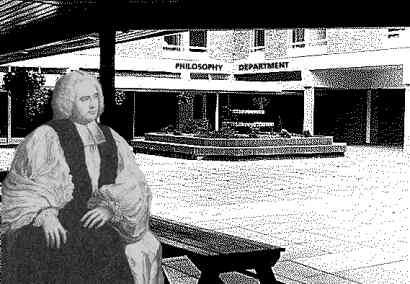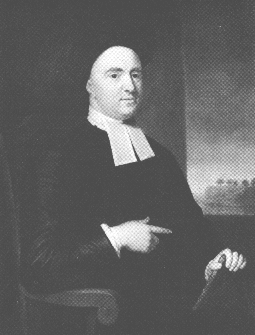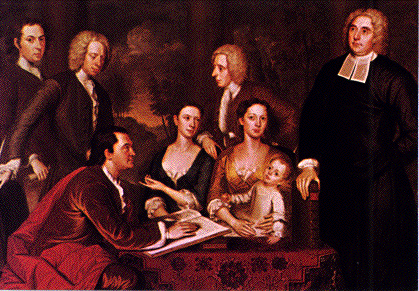
Contents
- The new question
- Descartes' answers
- Malebranche's answers
- Berkeley's answers
- Berkeley's argument against Locke
- Berkeley's general argument
- Berkeley's position
- Review questions
For web resources see here
| |
History of Philosophy in the 17th & 18th Centuries |
|||
BERKELEY'S IMMATERIALISM |
||||
In inventing the Modern mind, Descartes had introduced intermediaries between things in the material world on the one hand and the person who perceives those things on the other.
The intermediary was the idea. It was a mental entity, the thing a person was directly aware of.
Once the intermediary is invented however you have the following question:
And further:
If all I am directly in touch with are ideas, can I have any reason to think that there is a material world at all?
Before I say what I think, write down what you remember or conjecture Descartes' answers to these questions to be.
Let us consolidate the sense of 'idea' here by reviewing another contribution to the discussion of how our ideas relate to the things they purport to represent.
| Nicholas Malebranche (1638-1715). Born in France and educated in philosophy and theology in the Sorbonne. His work of 1674-5 De la recherche de la vériteé generally defended Cartesianism. |
Malebranche, generally a Cartesian, disagreed with Descartes on this point. Developing a different answer to the question of the relationship between our minds, our ideas and whatever is beyond them, Malebranche propounded the doctrine of 'occasionalism': the view that the experiences we have, including the perceptions we have of the world, must in fact be caused not by objects in the world - objects which in the case of perception they represent - but by God directly.
 Malebranche does not deny the existence of the world. He
thinks there is a world, but, he thinks, our belief in it can only be
based on faith (not in the sense of guesswork but faith well-grounded in scripture).
Malebranche does not deny the existence of the world. He
thinks there is a world, but, he thinks, our belief in it can only be
based on faith (not in the sense of guesswork but faith well-grounded in scripture).
Objects in the world do not themselves cause our perceptions, which are rather caused by the agency of God.
Though Malebranche was and remains a highly respected thinker, and defended these perhaps surprising views with arguments that demanded attention, to a Christian perspective they conjured the spectre of a Creation large parts of which appeared to be completely redundant. To minds accustomed to think of the world as created for the benefit of human beings, Malebranche's thesis that God fed our minds directly with all our experiences seemed to rob the world of any point.
This was a weakness that Berkeley was to fasten upon, in his campaign to show that rival views were silly, bereft of common-sense: to accept Malebranche's thesis, he says,
Locke's position is that the fact that we have ideas is good evidence for thinking that there is a material world, a position that many people seem to find tempting. His view is that there is a material world which gives rise to the ideas which are found in our minds. But in putting forward that position, Locke freely acknowledges that he hasn't a clue how the material might generate ideas - ie things which are non-material. He acknowledges that neither he nor his contemporaries can explain how this happens: he also thinks we wil probably never be able to explain it.
Do you agree with this?
Whether you share Locke's happy acceptance of ignorance or not, Berkeley exploits the concession Locke makes on this point. If we don't understand how a material thing can bring about the existence of an idea in us, then the fact that we have ideas is no argument at all for the conclusion that material things exist. Ideas remain equally inexplicable, whether there are material things mysteriously giving rise to them or not.
|
'[It might be regarded as simply probable that
there are such things as bodies that excite their ideas in our minds.
But neither can this be said; for, though we give the materialists their
external bodies, they by their own confession are never the nearer knowing
how our ideas are produced; since they own themselves unable to comprehend
in what manner body can act upon spirit, or how it is possible it should
imprint any idea in the mind. Hence it is evident the production of ideas
or sensations in our minds can be no reason why we should suppose Matter
or corporeal substances, since that is acknowledged to remain equally
inexplicable with or without this supposition. '
Principles of Human Knowledge, Section 19. |

Berkeley's thesis is that our having ideas has no tendency to show that material things exist, and that there are no valid arguments for the existence of material objects whatever.
And here is a positive argument:
|
'Suppose - what no one can deny possible- an intelligence without the
help of external bodies, to be affected with the same train of sensations
or ideas that you are, imprinted in the same order and with like vividness
in his mind. I ask whether that intelligence hath not all the reason to
believe the existence of corporeal substances, represented by his ideas,
and exciting them in his mind, that you can possibly have for believing
the same thing? Of this there can be no question- which one consideration
were enough to make any reasonable person suspect the strength of whatever
arguments be may think himself to have, for the existence of bodies without
the mind.'
Principles of Human Knowledge, Section 20. |
Prompt: So far, Berkeley appears to believe that there are only ideas.
Do you think this position is coherent?
 You may say: for there to be ideas in the sense they are
posited by these early writers, there also have to be minds to have them.
You may say: for there to be ideas in the sense they are
posited by these early writers, there also have to be minds to have them.
At any rate, Berkeley thinks there are ideas, and there are also minds (or spirits, as he sometimes says) to have them, but nothing else.
Ideas are completely dependent on the minds they exist in. For them, to be is to be perceived ('their esse is percipi ').
(Note that Berkeley speaks of 'sensible objects', but what he means by one of these is what we perceive, which he thinks is an idea.)
Berkeley:
'That neither our thoughts, nor passions, nor ideas formed by the imagination, exist without the mind, is what everybody will allow. And it seems no less evident that the various sensations or ideas imprinted on the sense, however blended or combined together (that is, whatever objects they compose), cannot exist otherwise than in a mind perceiving them.- I think an intuitive knowledge may be obtained of this by any one that shall attend to what is meant by the term exists, when applied to sensible things. The table I write on I say exists, that is, I see and feel it; and if I were out of my study I should say it existed- meaning thereby that if I was in my study I might perceive it, or that some other spirit actually does perceive it. ... This is all that I can understand by these and the like expressions. For as to what is said of the absolute existence of unthinking things without any relation to their being perceived, that seems perfectly unintelligible. Their esse is percipi, nor is it possible they should have any existence out of the minds or thinking things which perceive them.
Principles of Human Knowledge, Section 3.
'It is indeed an opinion strangely prevailing amongst men, that houses, mountains, rivers, and in a word all sensible objects, have an existence, natural or real, distinct from their being perceived by the understanding. But, with how great an assurance and acquiescence soever this principle may be entertained in the world, yet whoever shall find in his heart to call it in question may, if I mistake not, perceive it to involve a manifest contradiction. For, what are the fore-mentioned objects but the things we perceive by sense? and what do we perceive besides our own ideas or sensations? and is it not plainly repugnant that any one of these, or any combination of them, should exist unperceived?'
What should I have got from this section?
|
| Who thinks that in perception it is God who puts ideas into our minds? | ||
| Hobbes | Locke | |
| Descartes | Malebranche |
| Who thinks we have lots of ideas all the time, only a few of which we are actually conscious of? | ||
| Locke | Berkeley | |
| Wordsworth |
| Who thinks the very fact that we have ideas shows that there must be material objects? | ||
| Berkeley | Locke | |
| Who thinks that though we may stare at a badger all day and all night, it will never stimulate in us an idea of itself? | ||
| Locke | Berkeley | |
| Malebranche |
| What does Berkeley think we mean when we say "that table exists"? | ||
| That table is being perceived | That table is an idea in the mind of God | |
| Under certain conditions you would have experiences of a certain kind | That table is kickable |
END
 |
||
Last revised 12:01:05 |
||
from The History of Philosophy in the 17th & 18th Centuries:The Understructure of the Enlightenment |
||
A module of the BA Philosophy programme Institute of Environment Philosophy and Public Policy | Lancaster University | e-mail philosophy@lancaster.ac.uk |
d 12:01:05